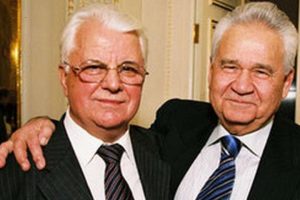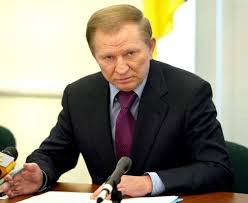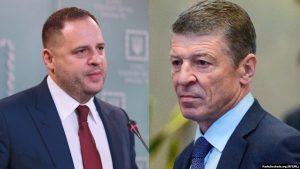
Kravchuk replaces former president Leonid Kuchma, who has retired from the position of delegation chief, citing fatigue. Kuchma was 76 when then-president Petro Poroshenko appointed him in 2014 to head the Ukrainian delegation to the TCG. While Kuchma could draw on solid international diplomatic experience for this assignment, Kravchuk and Fokin are basically Ukrainian parochial figures.
An erstwhile secretary of the Ukrainian Soviet Socialist Republic’s (SSR) Communist Party Central Committee, responsible for ideology and propaganda, Kravchuk switched sides to the patriotic forces in 1990 to become the founding father of the Ukrainian independent state and its first president (1991–1994). His track record after that is a checkered one, with maneuvers between variegated political camps (a customary practice in Ukrainian politics), in the shadow of the respective party leaders, and without international exposure. In his advanced years, Kravchuk became a sought-after, deferentially treated participant in talk shows on Ukrainian channels. He has a reputation for caution, cunning, and (in his own description) “sneaking in-between raindrops.” Kravchuk’s late-blooming popularity on TV almost certainly counted in the Zelenskyy Presidential Office’s decision to appoint him.
 Leonid Kravchuk went down not just in history but even in the Ukrainian language as his name was used to coin the term kravchuchka for a two-wheeled hand trolley mass used to carry heavy bags by marketeers, dacha owners, and poorest citizens. In the times of the 1990s economic crisis, people often used to buy deficit products in bulk to have a supply because inflation could make them more expensive in a matter of days or weeks. The mass usage of Kravchuchka in the 1990s made it an attribute of the Kravchuk era in Ukraine.
Leonid Kravchuk went down not just in history but even in the Ukrainian language as his name was used to coin the term kravchuchka for a two-wheeled hand trolley mass used to carry heavy bags by marketeers, dacha owners, and poorest citizens. In the times of the 1990s economic crisis, people often used to buy deficit products in bulk to have a supply because inflation could make them more expensive in a matter of days or weeks. The mass usage of Kravchuchka in the 1990s made it an attribute of the Kravchuk era in Ukraine.
Fokin, erstwhile a high official of the Ukrainian SSR’s State Planning Committee in 1971–1990 (its chairperson, 1987–1990), became the first prime minister of independent Ukraine (1990–1992). Fokin’s government is remembered for its disastrous economic policies, held responsible for mass pauperization at that time. He has lived in obscurity from 1992 to date.
What caused President Zelenskyy and his Office chief, Andriy Yermak (who has the say on all top personnel decisions and is, moreover, in charge of the conflict-resolution negotiations) to appoint such antiquated figures as Kravchuk and Fokin, whose past work experience hardly qualifies them for these posts? What are Kravchuk’s and Fokin‘s own views on this war? And what roles are they expected to play in the Minsk negotiations and parallel processes?
To be sure, Kravchuk and Fokin will be serving pro bono, and their advanced age may entitle them to their own independent judgments. But the same age factor will set physical limits to their activities in the Minsk Contact Group, and equally inevitably abridge their term of service in these talks. Whatever initiatives or projects the two of them may undertake, they may well be overshadowed by a sense that they cannot be there much longer anyway. They will be treated with outward respect but perhaps not taken entirely seriously by the professionally trained Russian representatives.

Kuchma, who is younger than Kravchuk and Fokin, reportedly became exhausted by the flights to Minsk and the nervous strain of the negotiations. He resigned in 2019, but Zelenskyy asked him to return as a stop-gap measure. According to Ukrainian delegates who joined the Minsk Contact Group in May 2020, Kuchma has not been seen attending the video-sessions in person, nor has his contribution been felt in any way (Dzerkalo Tyzhnia, July 28; Ukraiyinska Pravda, July 30). Kuchma’s role had all along been largely protocolary, as a top-level representative figure but not a government official. Yet Kuchma’s international diplomatic experience ensured that Poroshenko took his views into account.
While Kuchma was—and Kravchuk now is—the nominal (decorative) chief delegate, Deputy Prime Minister Oleksiy Reznikov is supposedly the real chief of the delegation to the Contact Group, with the title of deputy head of delegation. Hyperactive in this role, Reznikov has added layer upon layer to Ukraine’s Minsk delegation: deputy ministers representing various government ministries, Verkhovna Rada (parliament) committee chairs, representatives of pro-Ukraine refugees from the Russian-occupied Donetsk and Luhansk (see EDM, June 15, 17, 18, 22). Reznikov, moreover, gives frequent, lengthy interviews to Ukrainian mass media. And he generates multiple ideas about interpreting, revising, updating or circumventing the Minsk “agreements” because they do work for Russia against Ukraine. The Russian delegation, meanwhile, remains impassive and compact, lean and mean.

Behind the Ukrainian delegation’s baroque layers and bursts of public activity, Yermak is actually running the negotiations from the Presidential Office. The appointment of figureheads like Kravchuk and Fokin can only facilitate Yermak’s control of the real process. Yermak alone enjoys the preemptive, almost exclusive access to Zelenskyy’s ear, a direct communication channel to his Kremlin counterpart Dmitry Kozak, and ultimate authority over the appointments that really matter. It is almost certainly due to Yermak’s influence that Zelenskyy’s instructions have marginalized Ukraine’s Ministry of Foreign Affairs from the Minsk Contact Group negotiations. Notwithstanding its high level of professionalism and trove of experience in the Minsk and Normandy processes since 2014, this ministry plays—according to Foreign Minister Dmytro Kuleba—merely a supporting role (Glavkom, July 31).
It was the Yermak-Kozak direct channel that resulted in Ukraine’s signing the Steinmeier Formula (see EDM, October 3, 2019) and the quasi-recognition of the Donetsk-Luhansk armed formations in the recent, enhanced ceasefire agreement (see EDM, July 29, 30, August 5, 6, 2020). Kravchuk’s predecessor as a nominal delegation chief, Kuchma, had to sign on the dotted line in both cases. It remains to be seen how Kravchuk would respond in similar situations.
In that light, Yermak‘s latest claim that the Ukrainian side “has seized the initatiative in the negotiations” and even “dominates the negotiations” (Ukrinform, July 30) is misleading. Alluding as he does to the Reznikov-generated public brainstorms and the stream of new appointments to the Minsk delegation, Yermak is kicking up dust to conceal the actual direction of those negotiations: toward conflict-conservation on the Transnistria model.
According to Zelenskyy and Yermak, when announcing these appointments (Ukrinform, July 30, 31; Liga.net, August 4; UKrinform, August 6), Kravchuk and Fokin are well known, credible and respected figures “on the other side” (a euphemistic reference to the Russian-controlled territory) and can engage in a dialogue on that basis. But this belief, or claim, looks highly implausible. The last time Kravchuk’s standing was tested in that territory was in the 1994 presidential election when Kravchuk lost the Donetsk and Luhansk provinces by a landslide (to Kuchma, who won the presidency as the candidate of Ukraine’s east). Kravchuk, a native of Ukraine’s west (Rivne province), has no known ties to Donetsk or Luhansk.
For his part, Fokin (native to the Zaporizhzhia province) worked as a mining engineer in the Luhansk province from 1954 to 1971, after which he moved to Kiyv for good. He headed a Luhansk fraternal association in the Ukrainian capital for a while, but the fraternity’s leadership changed several times since then, and the current fraternity leader (Vadym Goran) is one of Reznikov’s civil-society appointees to the Minsk Contact Group delegation.
Kravchuk has laid out his views and tentative proposals in a stream of media interviews (Ukraiynska Pravda, RBK Ukraiyna, July 30; Ukraiyna 24 TV, Suspilniy, July 31, August 1; Vesti, August 3; 112 Ukraiyna, August 4; Obozrevatel, August 8, 10; Radio Svoboda, August 10); and he has even given a video-interview to Olga Skabeyeva’s vituperative anti-Ukrainian show on Russia One TV (the studio audience predictably shouted Kravchuk down during the show).
Kravchuk’s proposals are all conditional on the ceasefire holding indefinitely. He would consent to a “special administrative status” for the now-occupied territory. This status would be a) clearly below the political-constitutional special status stipulated in the Minsk “agreements,” which would imply quasi-statehood, but b) well above the ordinary status of all of Ukraine’s provinces. Kravchuk fully shares Zelenskyy’s declared position that local elections in the now-occupied territory can only be held after the withdrawal of Russian forces, disbandment of local forces and restoration of Ukrainian sovereignty, including control of the Ukraine-Russia border. Kravchuk advocates for a free economic zone, backed by an international reconstruction fund, to be created in the Donetsk and Luhansk provinces. He does not yet clarify whether this zone would cover the now-occupied territory (presumably after its de-occupation) or the whole area of Ukraine’s pre-2014 Donetsk and Luhansk provinces; or whether it would be designed to benefit local business, Ukrainian tycoons, or international investors. Kravchuk offers to draw on his own experience in setting up “free economic zones” in the Donetsk, Luhansk and Dnipropetrovsk provinces during his presidency in 1991–1994. Those experiments were a complete failure, however (Ukrinform, August 5; Censor.net, August 8).
Fokin, for his part, proposes to open a direct dialogue with selected interlocutors in Donetsk and Luhansk in a first phase, and bring Kravchuk (as delegation chief) along into that dialogue in a follow-up phase. Those potential interlocutors remain unidentified for now (Gordon, August 3; Radio Svoboda, August 5).
Read also:
- The quick way to quasi-recognition of Donetsk-Luhansk’s armed formations: a play-by-play account
- Kozak celebrates diplomatic victory over Ukraine in rude letter to Normandy Forum
- Kozak-Yermak plan on Donbas: The fine print
- Shady agreements legitimizing Russia’s puppet “republics” likely signed in Minsk
- Kyiv finds an alibi to step back from Kozak-Yermak plan on Donbas




